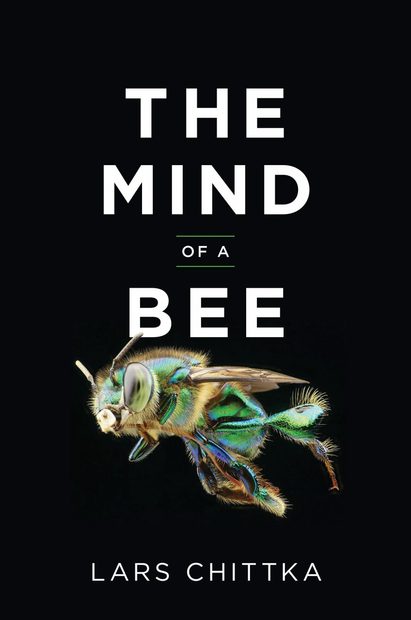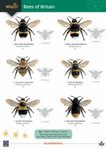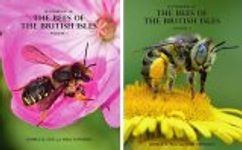By
Leon (NHBS Catalogue Editor)
9 Aug 2023
Written for Paperback

It is tough being a social insect. When people are not trying to exterminate you, they might marvel at the collectives you form, but does anybody think much of you, the individual? Leave it to Lars Chittka, a professor in sensory and behavioural ecology, to change your views.
The Mind of a Bee is a richly illustrated, information-dense book that explores a large body of scientific research, both old and new.
Chittka is very focused in his approach and
The Mind of a Bee effectively summarizes a large number of experimental studies in narrative form, with very few diversions. He cleverly avoids overheating your brain by having chapters flow logically into each other, but especially by dividing each chapter into short, headed sections. Each of these takes a particular question and discusses a few relevant studies in anywhere from one-half to three pages. Some of these are his own work but he ranges far and wide and includes both classic and recent research. The book is furthermore illustrated with numerous diagrams and photos that helpfully clarify experimental protocols and results. Honey bees are unsurprisingly the most intensively studied but Chittka discusses informative studies across a range of bee species and sometimes other insects as well. The book roughly covers three biological disciplines: sensory and neurobiology, ethology, and psychology.
Justifiably, the book opens with sensory biology. Before we understand what is in the mind of any organism, Chittka argues, we first need to understand the gateways, the sense organs, through which information from the outside world is filtered. These are shaped by both evolutionary history and daily life (i.e. what information matters on a day-to-day basis and what can be safely ignored). Chapter 2 deals with the historical research that showed that bees do have colour vision and furthermore can perceive ultraviolet (UV) light. Chapter 3 bundles together research on numerous other senses, including ones familiar (smell, taste, and hearing) and unfamiliar to us (perception of polarized light, Earth's magnetic field, and electric fields). The antennae of bees, in particular, are marvels; Chittka likens them to a biological Swiss army knife, packing numerous different sense organs into two small appendages. Tightly connected to sensory biology is how this incoming information is processed in the brain, though Chittka postpones discussing neurobiology to chapter 9. He describes the discovery and function of different brain areas and highlights the work of Frederick Kenyon who would inspire the better-remembered Santiago Ramón y Cajal. Thanks to them, we now understand that brains consist of numerous specialised nerve cells. Though the bee brain is small, Chittka argues that size is a poor predictor of cognitive skills; it is the wiring of neurons that matters. Rather than be surprised that small-brained insects such as bees can do so many clever things, Chittka instead tickles the reader with the opposite question: "Why does any animal need as large a brain as a bee's?" (p. 153).
What clever things do bees do, you ask? That is the subject of the preceding five chapters where Chittka surveys a large body of behavioural research. Honey bees are famous for their waggle dance by which they communicate the location of flowers but also, this was news to me, the location of potential nest sites when the swarm relocates. But Chittka discusses more, much more: how bees navigate space using landmarks, show a rudimentary form of counting, solve the travelling salesman problem, learn to extract nectar from complex flowers, learn when to exploit certain flowers (and when to ignore them), and learn new tricks by observing other bees. But what about instinct, something most behaviours were traditionally ascribed to? He has some insightful comments on this: "even the most elemental behavior routines need to be refined by learning: instinct provides little more than a rough template" (p. 50). What really made me fall off my chair is that bees have long been outsmarting researchers in choice experiments. Many behavioural experiments take the form of choice tests, where bees need to pick between two locations or objects that differ in e.g. colour or shape with one option containing a sugary solution as a reward. Bumblebees would simply be lazy and check out both options in random order. Until, that is, protocols were modified by adding a bitter-tasting solution to the wrong choice as a penalty.
The final two chapters explore bee psychology. One chapter shows how, in a hive full of bees, the members are not anonymous and interchangeable. Rather, they show individual differences in e.g. their preferred order in which to visit flowers during foraging or how fast they learn to solve problems. The final chapter makes the case that bees have a form of consciousness, though Chittka clarifies he is not arguing it is as rich and detailed as that of humans. That said, they show a slew of behaviours that scientists will label as evidence for consciousness when exhibited by bigger-brained vertebrates. Chittka is happy to play devil's advocate: sure, theoretically, all the behaviours described in this book could be replicated by an unconscious algorithm. However, the required list of specific instructions is growing long and, increasingly, the more likely answer seems to be that bees possess "a consciousness-based general intelligence system" (p. 208).
As mentioned above, this book is focused. If you enjoy reading about the facts and the study system with minimal (autobiographical) diversions, Chittka has got you covered. The only digression he allows himself is to include biographical details of older generations of scientists. This includes inspiring tales such as Karl von Frisch who described the honey bee waggle dance and later barely escaped being dismissed from his post by the nazis. And look out for repeat appearances of Charles Turner, a now largely forgotten African American scientist who published pioneering work despite having been denied a professorship based on his ethnicity. But there are also tragic stories such as Kenyon's, who snapped under pressure of not securing a permanent job was incarcerated in a lunatic asylum where he died more than 40 years later, alone and forgotten. Chittka includes occasional quotations from historical literature to show that "many seemingly contemporary ideas about the minds of bees had already been expressed, in some form, over a century ago" (p. 15).
The Mind of a Bee makes for fascinating reading, convincingly showing that bees are anything but little automatons. The tight structure and numerous illustrations make it accessible, though be prepared for an information-dense book.







































